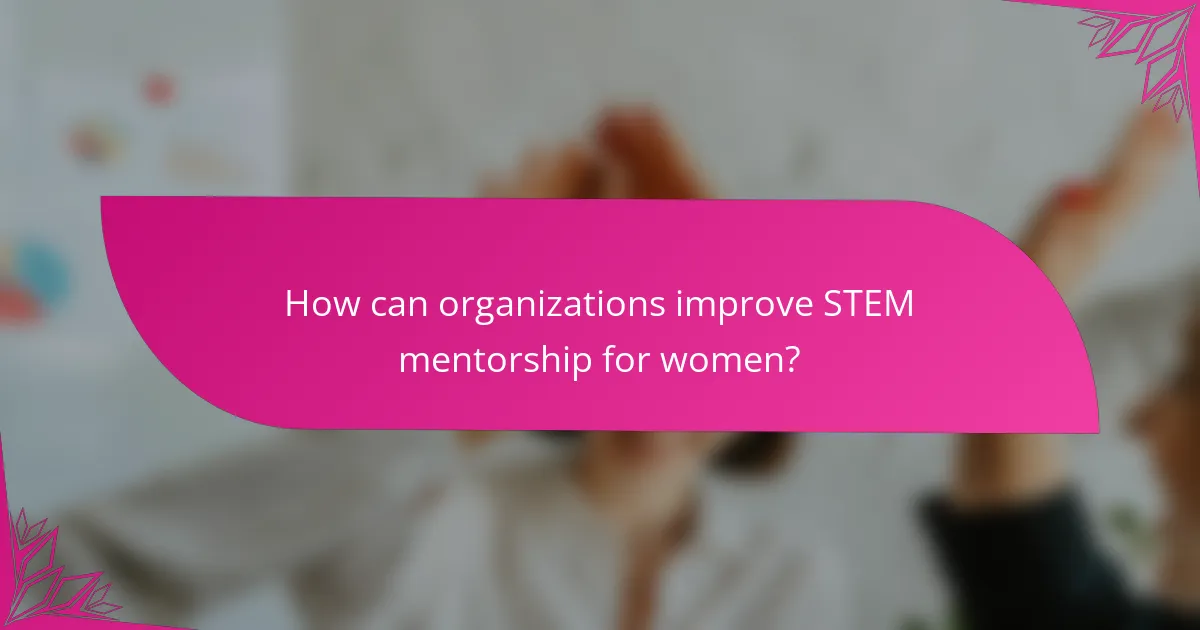The mentorship of women in STEM plays a crucial role in shaping their professional journeys, offering both short-term and long-term benefits. In the immediate term, mentorship fosters increased confidence and skill development, while also providing essential networking opportunities. Over time, these relationships contribute to enhanced career trajectories and improved retention rates, despite the challenges women face in accessing mentorship and navigating biases within the field.

What are the short-term benefits of STEM mentorship for women?
Short-term benefits of STEM mentorship for women include increased confidence, enhanced networking opportunities, and immediate skill development. These advantages can significantly impact a woman’s career trajectory in science, technology, engineering, and mathematics fields.
Increased confidence and self-efficacy
Mentorship can boost a woman’s confidence and self-efficacy by providing guidance and support in navigating challenging environments. When women receive encouragement from experienced mentors, they are more likely to take on leadership roles and pursue ambitious projects.
For instance, a mentor may help a mentee prepare for a presentation or project, reinforcing her belief in her abilities. This newfound confidence can lead to a greater willingness to engage in STEM activities and seek out further opportunities.
Enhanced networking opportunities
STEM mentorship opens doors to valuable networking opportunities, connecting women with industry professionals and peers. A mentor often introduces their mentee to their own network, facilitating relationships that can lead to internships, job offers, or collaborations.
Participating in networking events or conferences alongside a mentor can also provide insights into industry trends and expectations. This exposure helps mentees build a professional identity and establish connections that may benefit their careers in the long run.
Immediate skill development
Through mentorship, women can acquire essential skills relevant to their fields quickly. Mentors often provide tailored advice and resources that help mentees develop technical and soft skills, such as coding, project management, or effective communication.
For example, a mentor might guide a mentee through a specific software program or help her refine her resume. This hands-on learning approach accelerates skill acquisition and prepares women for immediate challenges in their STEM careers.

What are the long-term benefits of STEM mentorship for women?
Long-term benefits of STEM mentorship for women include enhanced career trajectories, improved retention rates in STEM fields, and the development of valuable professional networks. These outcomes can significantly impact women’s success and satisfaction in their careers over time.
Career advancement and leadership roles
Mentorship in STEM often leads to greater career advancement opportunities for women, as mentors can provide guidance, support, and advocacy. Women with mentors are more likely to pursue leadership roles and receive promotions, as mentors help navigate organizational dynamics and identify growth opportunities.
For example, women in STEM fields who have mentors may find themselves more prepared for leadership positions, as mentors can share insights on effective management and decision-making. This support can lead to a higher representation of women in executive roles within tech and engineering companies.
Increased retention in STEM fields
Mentorship plays a crucial role in increasing retention rates for women in STEM careers. By fostering a sense of belonging and providing emotional support, mentors can help women overcome challenges that might otherwise lead them to leave the field.
Studies suggest that women with mentors are significantly more likely to remain in their STEM careers long-term. This retention not only benefits the individuals but also contributes to a more diverse and inclusive workforce, which is essential for innovation and progress in the industry.
Long-lasting professional relationships
One of the key long-term benefits of STEM mentorship is the establishment of enduring professional relationships. These connections can provide ongoing support, collaboration opportunities, and access to new networks throughout a woman’s career.
Mentors often become advocates for their mentees, helping them connect with other professionals, share job opportunities, and gain visibility in their fields. This network can be invaluable, especially in industries where personal connections can lead to new projects or positions.

What challenges do women face in STEM mentorship?
Women in STEM often encounter significant challenges in mentorship, including limited access to opportunities, societal biases, and the struggle to balance personal commitments. These barriers can hinder their professional growth and development in a predominantly male-dominated field.
Access to mentorship opportunities
Access to mentorship opportunities is crucial for women in STEM, yet many face barriers such as a lack of female role models and networking opportunities. Women may find it difficult to connect with mentors who understand their unique challenges and can provide tailored guidance.
To improve access, organizations can implement formal mentorship programs that actively recruit female mentors and create inclusive networking events. This can help bridge the gap and foster a supportive environment for women in STEM.
Societal and cultural biases
Societal and cultural biases can significantly impact women’s experiences in STEM mentorship. Stereotypes about gender roles may lead to undervaluing women’s contributions and capabilities, making it harder for them to gain recognition and support.
Addressing these biases requires a collective effort to challenge stereotypes and promote diversity within STEM fields. Initiatives such as bias training and awareness campaigns can help create a more equitable environment for women seeking mentorship.
Balancing mentorship with personal commitments
Many women in STEM struggle to balance mentorship with personal commitments, such as family responsibilities and work obligations. This juggling act can lead to feelings of overwhelm and hinder their ability to engage fully in mentorship relationships.
To manage this balance, women can set clear boundaries and prioritize their time effectively. Seeking flexible mentorship arrangements, such as virtual meetings or short-term commitments, can also help accommodate personal schedules while still benefiting from mentorship.

How can organizations improve STEM mentorship for women?
Organizations can enhance STEM mentorship for women by implementing structured programs, providing comprehensive training for mentors, and fostering an inclusive culture. These strategies create a supportive environment that encourages women’s participation and success in STEM fields.
Implement structured mentorship programs
Structured mentorship programs provide clear guidelines and expectations for both mentors and mentees. Organizations should outline specific goals, timelines, and activities to ensure that mentorship is effective and focused.
Consider pairing mentees with mentors who have similar interests or career paths. Regular check-ins can help track progress and adjust goals as needed, ensuring that the mentorship remains relevant and beneficial.
Provide training for mentors
Training for mentors is essential to equip them with the skills needed to support their mentees effectively. This training should cover topics such as communication, feedback techniques, and cultural competency to address the unique challenges women may face in STEM.
Offering workshops or online courses can help mentors develop these skills. Additionally, providing resources such as guides or toolkits can enhance their ability to foster productive relationships with mentees.
Foster an inclusive culture
Creating an inclusive culture is crucial for the success of mentorship programs. Organizations should actively promote diversity and inclusion initiatives that encourage participation from women and underrepresented groups in STEM.
Encouraging open dialogue about challenges and successes can help build a supportive community. Celebrating achievements and sharing stories of successful mentorship can inspire others and reinforce the value of these programs.

What insights can be drawn from successful STEM mentorship programs?
Successful STEM mentorship programs reveal that structured support and guidance can significantly enhance women’s participation and advancement in these fields. Key insights include the importance of tailored mentorship approaches, fostering a supportive community, and addressing specific challenges faced by women in STEM.
Case studies of effective mentorship
One notable case study is the National Science Foundation’s ADVANCE program, which focuses on increasing the representation of women in academic STEM careers. By implementing targeted mentorship initiatives, the program has seen a marked increase in retention and promotion rates for women faculty.
Another example is the Association for Women in Science (AWIS), which offers a mentorship program that pairs early-career women with experienced professionals. Participants report improved confidence, networking opportunities, and career advancement, highlighting the program’s effectiveness in fostering professional growth.
Best practices from leading organizations
Leading organizations emphasize the need for structured mentorship frameworks that include clear goals and regular check-ins. Establishing a formalized process helps ensure accountability and progress tracking for both mentors and mentees.
Additionally, successful programs often incorporate diversity training for mentors to better understand the unique challenges faced by women in STEM. This training equips mentors with the tools to provide more effective support and guidance.
Lastly, creating a community around mentorship can enhance the experience. Regular networking events and workshops allow mentees to connect with peers and mentors, fostering a sense of belonging and shared purpose in the STEM field.


